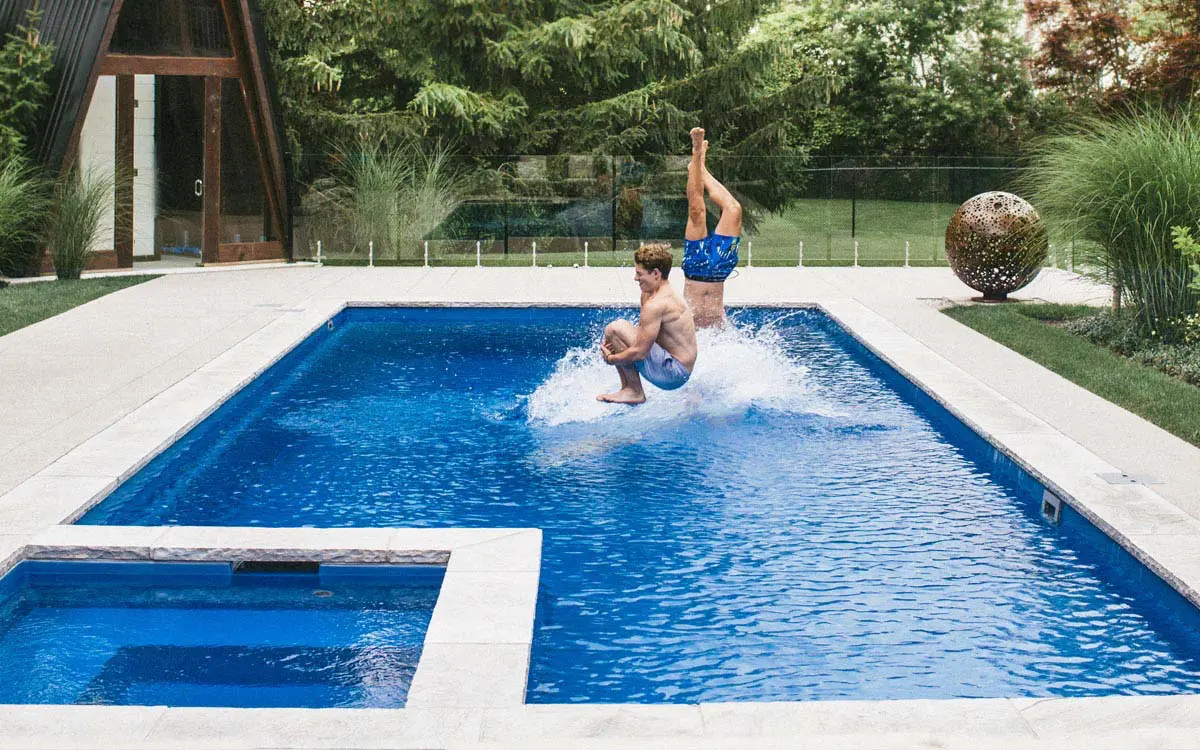Introduction
Imagine stepping into your backyard oasis, where your pool water feels as smooth as silk and free from the harsh sting of traditional chlorine. No more red eyes, dry skin, or the overwhelming smell of chemicals—just a pristine, refreshing swim every time.
Now, what if maintaining that perfect swimming experience was easier and more cost-effective?
Salt water chlorinators are transforming pool care, offering a more natural, low-maintenance way to keep your pool clean and sanitized. But while saltwater systems work well for some pools, they are not ideal for all. The best match? Fiberglass pools.
In this guide, we’ll explore how salt water chlorinators work, why they pair perfectly with fiberglass pools, and the long-term benefits they offer. Whether you’re a current pool owner looking for an upgrade or considering installing a new pool, this article will help you understand why a salt water pool chlorinator is a game-changer.
What is a Salt Water Chlorinator?
How It Works
A salt water chlorinator, also known as a salt chlorine generator, revolutionizes pool sanitation by converting salt into chlorine. Here’s how the process works:
- Small amounts of salt (sodium chloride) are added to the pool water.
- As the water passes through the chlorine generator cell, an electrolysis process occurs.
- This process converts salt into chlorine gas, which dissolves into the water, providing continuous sanitization.
- The chlorine neutralizes bacteria and algae, keeping the pool clean and safe without the need for frequent chemical additions.
Key Benefits of Salt Water Chlorination
Switching to a saltwater pool system comes with notable advantages:
- More consistent chlorine levels – No more sudden spikes or drops in chlorine concentration.
- Eliminates the need to store and handle large amounts of chlorine – No more harsh chemical odors or safety concerns.
- A gentler swimming experience – The water feels softer, with significantly fewer irritants for the skin and eyes.
Benefits of Salt Water Chlorinators
Healthier & Softer Water
One of the most noticeable benefits of a saltwater pool is how much better the water feels. Unlike traditional chlorine pools, where chemical additives can cause skin and eye irritation, saltwater pools provide a gentler, more natural swimming experience:
- Less irritation – Say goodbye to red eyes, itchy skin, and dry hair.
- A silkier feel – Many swimmers describe the water as feeling smooth and luxurious.
Reduced Chemical Handling
With a salt water chlorinator, you no longer need to manually add chlorine tablets or liquid chlorine regularly. The system generates chlorine automatically, reducing your exposure to harsh chemicals and minimizing maintenance time.
- Less frequent chemical adjustments – The system maintains proper chlorine levels for you.
- No need to store large amounts of chlorine – A safer, more convenient solution for homeowners.
Cost Efficiency Over Time
While the initial investment in a saltwater system is higher, the long-term savings make it worthwhile:
- Fewer chemical purchases – Saltwater pools require fewer additional chemicals, reducing ongoing costs.
- Lower maintenance expenses – Less wear and tear means fewer repairs and fewer costly resurfacing projects.
Why Fiberglass Pools Are Ideal for Salt Water
Superior Durability
Fiberglass pools are the best choice for saltwater systems because they are incredibly durable and resistant to salt-related damage:
- Non-porous surface – Unlike concrete, fiberglass does not absorb water, preventing salt from causing erosion.
- Resistant to salt exposure – Saltwater won’t degrade the surface, ensuring longevity.
Minimal Maintenance
A fiberglass pool requires far less maintenance compared to concrete or vinyl pools:
- Smooth gel coat finish – Prevents algae buildup, reducing the need for scrubbing and chemical treatments.
- No need for resurfacing – Unlike concrete pools, which require frequent refinishing, fiberglass pools maintain their integrity for decades.
Comparison with Concrete Pools
Why Concrete Pools Struggle with Saltwater
Concrete pools are not well-suited for saltwater systems due to their porous nature:
- Salt penetration leads to erosion – Over time, salt seeps into the concrete, causing cracks and structural damage.
- Frequent resurfacing required – To prevent deterioration, concrete pools need regular sealing and resurfacing, adding to maintenance costs.
- Higher chemical absorption – Concrete absorbs more chemicals, requiring additional chlorine to maintain proper sanitation.
Comparison with Vinyl Pools
The Risks of Saltwater in Vinyl Pools
While vinyl liner pools can technically use saltwater systems, they come with significant risks:
- Vinyl liners degrade faster – Salt can weaken and wear down the liner, leading to costly replacements.
- Metal components can corrode – Many vinyl pools have metal wall panels or fasteners, which can rust and deteriorate when exposed to saltwater.
- Fiberglass eliminates these risks – With no liners to replace and no metal components to corrode, fiberglass pools are the safest, longest-lasting option.
Long-Term Cost Savings
Lower Chemical Costs
Saltwater pools require fewer chemicals than traditional chlorine pools, which translates to lower ongoing expenses:
- No need for chlorine tablets or liquid chlorine – The saltwater system generates chlorine automatically.
- Fewer additional chemicals needed – Stabilizers, algaecides, and shock treatments are used less frequently.
Reduced Repair & Maintenance
Since fiberglass pools resist algae growth and structural damage, maintenance costs remain low over time:
- No resurfacing required – Unlike concrete pools, fiberglass pools don’t need expensive refinishing.
- Fewer equipment repairs – Saltwater systems operate smoothly with minimal upkeep.
Impact on Pool Water Quality
A More Enjoyable Swimming Experience
Saltwater pools provide cleaner, clearer, and more comfortable water:
- Less chlorine smell – Unlike traditional chlorine pools, saltwater pools don’t produce a strong, overpowering odor.
- Crystal-clear water – The consistent chlorination process helps maintain pristine water quality.
Balanced Water Chemistry
A salt water chlorinator helps maintain stable pH and chlorine levels, preventing sudden fluctuations that can cause irritation or algae growth.
Environmental Benefits
Eco-Friendly Pool Care
Switching to a saltwater pool is a more environmentally responsible choice:
- Less chlorine runoff – Reduced chemical usage means less impact on local water systems.
- Fewer chemical byproducts – Traditional chlorine pools create harmful chloramines, whereas saltwater pools generate cleaner, more sustainable sanitation.
Ease of Maintenance
Fewer Algae Issues
The non-porous surface of fiberglass pools prevents algae from taking hold, making maintenance significantly easier.
- Less scrubbing required – No need for excessive brushing to remove algae buildup.
- Saltwater naturally inhibits algae – The continuous chlorination process helps keep algae at bay.
Lower Cleaning Requirements
With a fiberglass saltwater pool, you’ll spend less time cleaning and adjusting chemicals and more time enjoying your pool.
Salt Concentration Misconceptions
Not as Salty as You Think
Many people assume saltwater pools feel like the ocean, but this is far from the truth:
- Saltwater pools contain only 3,000-3,500 ppm of salt – That’s about 1/10th the salinity of seawater, making it gentle on the skin and eyes.
- You won’t taste or feel the salt – The water remains fresh and comfortable, not overly salty.
Conclusion
If you’re looking for a low-maintenance, cost-effective, and luxurious swimming experience, a salt water chlorinator paired with a fiberglass pool is the perfect choice.
With superior durability, minimal maintenance, and long-term savings, fiberglass pools are the ideal match for saltwater systems. Ready to transform your backyard into the ultimate swimming retreat? Contact us today to explore your options and get expert guidance on installing a salt water chlorinator in your fiberglass pool!

